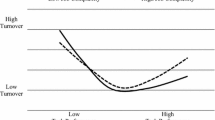Abstract
Recent articles concerned with the (dis)utility of turnover have refocused attention on the relation between ability and turnover. Jackofsky and Peters (1983) have presented a model of the turnover process that hypothesizes that ability has an indirect effect on turnover through the intervening variables of ease of movement, desirability of movement, and intention to quit, and the moderator variable of task complexity. This study failed to support the hypotheses based on the model. Ability appeared to have a direct, negative association with turnover, and task complexity showed no moderating effect on either desirability of movement or turnover.
Similar content being viewed by others
References
Dalton, D. & Todor, W. (1979). Turnover turned over: An expanded and positive perspective.Academy of Management Review, 4, 539–559.
Dalton, D., Krackhardt, D., & Porter, L. (1981). Functional turnover: An empirical assessment.Journal of Applied Psychology, 66, 716–721.
Dreher, G. (1981). The role of performance in the turnover process.Academy of Management Journal, 25, 137–147.
Fishbein, M. & Ajzen, I. (1975).Belief, attitude, intention and behavior: An introduction to theory and research. Reading, MA: Addison-Wesley.
Hulin, C. (in press). Adaptation, persistence and commitment in organizations. In M. Dunnett (ed.),The handbook of industrial and organizational psychology, 2nd edition.
Jackofsky, E. (1984). Turnover and job performance: An integrated process model.Academy of Management Review, 9, 74–83.
Jackofsky, E. & Peters, L. (1980). Task-relevant ability and turnover: Test of a model.Southwest Academy of Management Proceedings, 161–165.
Jackofsky, E. & Peters, L. (1983). The hypothesized effects of ability in the turnover process.Academy of Management Review, 8, 46–49.
Kunin, T. (1955). The construction of a new type of attitude measure.Personnel Psychology, 8, 65–78.
March, J. & Simon, H. (1958).Organizations. New York: Wiley & Sons.
Martin, T. (1979). A contextual model of employee turnover intentions.Academy of Management Journal, 22, 313–324.
McEvoy, G. & Cascio, W. (1985). Turnover and employee performance: A meta-analytic review. Presented at the annual meetings of the Academy of Management, San Diego, August.
Mobley, W. (1982).Employee turnover: Causes, consequences and control. Reading, MA: Addison-Wesley.
Muchinsky, P. & Tuttle, M. (1979). Employee turnover: An empirical and methodological assessment.Journal of Vocational Behavior, 14, 43–77.
Rosse, J. (1983). Employee withdrawal and adaptation: An expanded framework. Ph.D. dissertation, Department of Psychology, University of Illinois at Urbana-Champaign.
Rosse, J. & Hulin, C. (1985). Adaptation to work: An analysis of employee health, withdrawal and change.Organizational Behavior and Human Decision Processes, 36, 324–347.
Schuh, A. (1967). The predictability of employee tenure: A review of the literature.Personnel Psychology, 20, 133–152.
Sims, H., Szilagyi, A. & Keller, R. (1976). The measurement of job characteristics.Academy of Management Journal, 19, 195–212.
Smith, P., Kendall, L. & Hulin, C. (1969).The measurement of satisfaction in work and retirement. Chicago: Rand-McNally.
Staw, B. & Oldham, G. (1978). Reconsidering our dependent variables: A critique and empirical study.Academy of Management Journal, 21, 539–559.
Werbel, J. & Gould, S. (1984). A comparison of the relationship of commitment to turnover in recent hires.Journal of Applied Psychology, 69, 687–690.
Author information
Authors and Affiliations
Rights and permissions
About this article
Cite this article
Rosse, J.G. Job-related ability and turnover. J Bus Psychol 1, 326–336 (1987). https://doi.org/10.1007/BF01018142
Issue Date:
DOI: https://doi.org/10.1007/BF01018142




